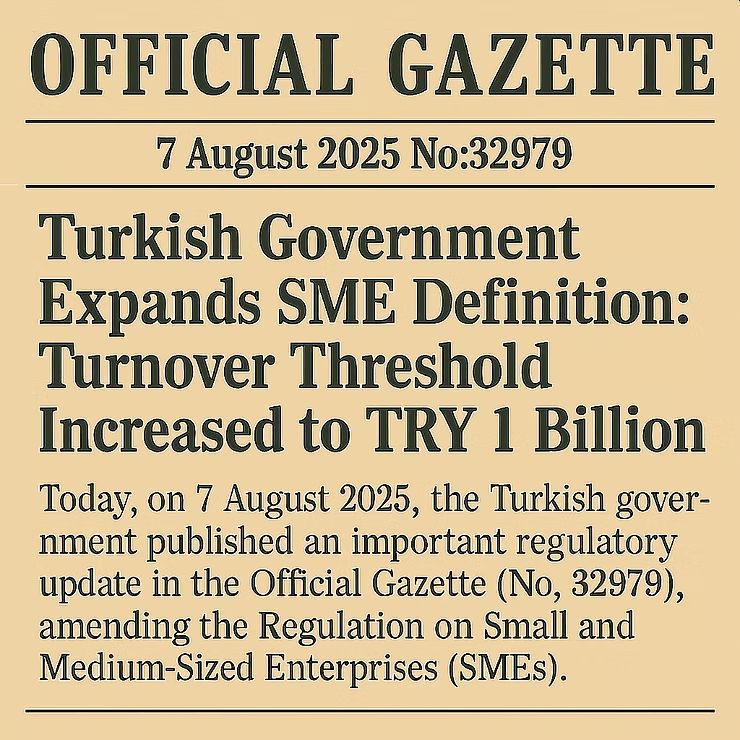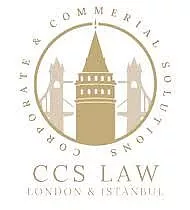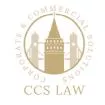- within Government and Public Sector topic(s)
- in United States
- within Government, Public Sector, Environment and Consumer Protection topic(s)
- with readers working within the Banking & Credit and Insurance industries
Today, on 7 August 2025, the Turkish government published an important regulatory update in the Official Gazette (No. 32979), amending the Regulation on Small and Medium-Sized Enterprises (SMEs).

According to Presidential Decree No. 10182, the turnover threshold used to define SMEs in Turkey has been significantly increased. The key changes are as follows:
- Article 4(1)(b) of the original regulation, which defines an SME as a business with an annual net turnover or balance sheet total not exceeding TRY 500 million, has been amended to increase this threshold to TRY 1 billion.
- A parallel amendment was made to Article 5(1)(c), affecting the classification of "medium-sized enterprises," which now includes businesses with an annual net turnover or balance sheet total of up to TRY 1 billion, instead of the previous limit of TRY 500 million.
These changes are effective immediately upon publication and reflect the government's response to inflationary pressures and changing market realities in Turkey.
The Regulation on SMEs plays a central role in determining which enterprises are eligible for support schemes, grants, and preferential legal frameworks. Businesses that previously exceeded the old limits may now qualify as SMEs, unlocking new opportunities in public procurement, incentives, and financial support.
What Is the SME Regulation in Turkey?
The Regulation on Small and Medium-Sized Enterprises defines the criteria, classification, and application framework for SMEs across all institutions and organisations in Turkey. It aims to standardise how SMEs are identified and to facilitate consistent implementation of SME-related legislation and support mechanisms.
Who Does the Regulation Apply To?
The regulation applies to all public and private entities in Turkey when assessing SME qualifications. It forms the basis for SME eligibility in areas such as government grants, tax reliefs, innovation incentives, and procurement policies.
Key Definitions Under the Regulation
- SME (KOBİ): A business with fewer than 250 employees and either an annual turnover or balance sheet total not exceeding TRY 1 billion (as of August 2025).
- Micro Enterprise: Fewer than 10 employees and turnover or balance sheet not exceeding TRY 10 million.
- Small Enterprise: Fewer than 50 employees and turnover or balance sheet not exceeding TRY 100 million.
- Medium-Sized Enterprise: Fewer than 250 employees and turnover or balance sheet not exceeding TRY 1 billion.
What's New in the 2025 Update?
On 7 August 2025, the Official Gazette published amendments increasing the financial thresholds that determine SME status:
- Thresholds Raised: The upper limit for medium-sized enterprises increased from TRY 500 million to TRY 1 billion in turnover or balance sheet.
- This means that more companies can now be classified as SMEs, gaining access to SME-specific incentives.
Other Key Provisions in the SME Regulation
- Employee Count Calculation: Based on full-time equivalent (FTE) employees calculated using annual working days.
- Independence Criteria: A business must not be more than 25% owned by another company (unless exempted, e.g., universities or municipalities).
- Enterprise Types: Businesses are categorised
as:
- Independent Enterprise
- Partner Enterprise
- Linked Enterprise – with ownership and control thresholds defined in detail.
- Financial Data Basis: Data from the most recent fiscal year are used to determine SME status.
- Exclusions: Businesses controlled by public entities exceeding certain thresholds are not considered SMEs.
At CCS Law, we are closely monitoring how these updated SME thresholds and classifications will affect entrepreneurs, investors, and corporate structures both in Turkey and internationally.
The content of this article is intended to provide a general guide to the subject matter. Specialist advice should be sought about your specific circumstances.


